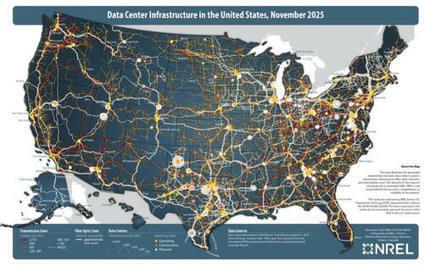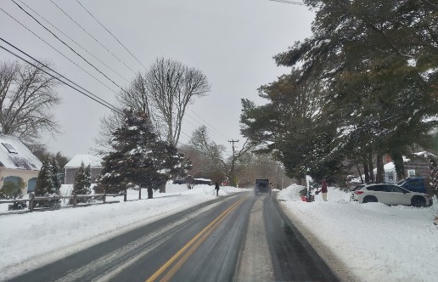 Your new post is loading...
 Your new post is loading...
Speaking on Tuesday at a summit in the United Arab Emirates, Sánchez criticized technology companies for allowing harmful content like child abuse and deepfake images.
Donica Brady has worked as a security guard, a school bus driver, and a fabricator of corrugated metal and bridge girders. But her favorite job has been helping to bring solar panels and batteries to tribal communities struggling to pay their utility bills. “I grew up in a single-parent home,” said Brady, an enrolled member of the Northern Cheyenne Tribe. “My mom sometimes had to choose which bills to pay. One of the highest bills here is electricity.” So when Brady got a job offer from the nonprofit group Indigenized Energy, she leapt at the chance. The administration then ripped away hundreds of millions of dollars for clean energy projects on tribal lands. Now tribes are fighting to salvage their work.
Donica Brady lost her job after the Trump administration cut grant funding to bring solar power across the country, including to tribal nations. She picked up multiple jobs to make ends meet. That, in addition to caring for children, whittled down Brady’s free time. So she invited reporter Ilana Newman over when she found a quiet moment—while skinning a deer—to talk about what the loss of solar funding meant to her and her community. “When the opportunity came up to work and help us get something established…it was huge,” she said. Brady was one of many Indigenous people working to build energy sovereignty for tribal nations—work that continues despite the administration clawing back federal funds.
After a lengthy call to the public that included appeals from residents and supporters of the environmentally ill community east of Snowflake, the Navajo County Board of Supervisors voted Jan. 27, following a closed-door executive session, to approve the special use permit and settlement agreement, clearing the way for the construction of a controversial 120-foot cell tower near White Antelope Road and Concho Highway. The vote followed the board’s initial denial of the special use permit on Nov. 12, 2024, a decision that led to litigation by SBA Communications, and months of continued opposition from residents of a nearby disability-focused community. Residents say the tower threatens their health, homes and access to daily services, but supervisors said federal law left them with little discretion. The board approved both the special use permit and a settlement agreement with SBA Communications by a 4-1 vote, with Supervisor Fern Benally voting no. During the call to the public, speakers focused on three central issues: the unique medical vulnerabilities of people living in the area, whether the tower is necessary given existing coverage and concerns that approval would allow corporations to override local decisions through litigation.
Climate science, over the past few decades, especially since the turn of the new century, has increasingly identified trouble spots with ecosystems that
Taiwan’s exports jumped nearly 35% last year. Companies like chip-maker TSMC and Foxconn, a manufacturer of iPhones, have logged record profits and revenues.
Five years after Winter Storm Uri caused catastrophic blackouts that killed hundreds, the electric grid has changed significantly, but increasing demand means it will have to adapt even more.
DALLAS--(BUSINESS WIRE)--Pacifico Energy today announced a major advancement of its GW Ranch project, a private-grid power generation campus in West Texas purpose-built for hyperscale data centers and the next wave of AI innovation. GW Ranch has received its Texas Commission on Environmental Quality (TCEQ) air permit for 7.65 GW of gas-fired power generation, the largest permit granted in the United States of America. Securing the TCEQ air permit authorizes construction and operation under state and federal air-quality requirements. This approval validates Pacifico's emissions-control strategy and advances a key regulatory milestone on the path to commercial operation.
NANTUCKET – A federal judge has given Vineyard Wind the go-ahead to resume construction while the offshore wind industry continues its legal battle against the Trump Administration’s work freezes. The preliminary injunction came from US District Court Judge for Massachusetts Brian E. Murphy. Officials with the project say the development is over 90 percent complete and almost ready to deliver power to the grid.
YARMOUTH PORT – The International Fund for Animal Welfare is starting a new initiative to develop predictive models that will identify high-risk areas for North Atlantic right whales in Massachusetts Bay and Stellwagen Bank. IFAW says the new research offers a way to forecast when — and where – whales are likely to be foraging so that ships will be able to avoid them. It will be made possible in part by using data from tagged whales and the measurement of zooplankton, the whale’s food source.
Earlier this month, “Marketplace” kicked off our AI series looking at whether the industry, with its hundreds of billions of dollars in spending on data centers specifically, is becoming too big to fail. “Marketplace” host Kai Ryssdal also visited a Los Angeles data center, and “Marketplace Tech” host Meghan McCarty Carino looked into people’s negative feelings about our AI future. To wrap up this leg of the reporting, Ryssdal and McCarty Carino spent the day on the ground together in Silicon Valley to explore the AI economy — and the trade-offs that come with it. Despite the AI boom, McCarty Carino, who both lives in and grew up in the Bay Area, noted that it doesn’t feel like a boom time for the local economy.
Hello and welcome to The Associated Press Climate Watch newsletter. I’m Jonathan Drew, an editor on AP’s Climate and Environment team.
Flood and weather warnings from both Environment Agency and the Met Office are in place across much of the UK. Storm Chandra brought travel disruption and flooding as strong winds and heavy rain hit much of the UK.
|
NANTUCKET – State officials have announced $343,985 in grants to restore and protect wildlife habitat, including almost $150,000 in funding to support a pair of projects protecting pitch pine and scrub oak habitats in Martha’s Vineyard and Nantucket. Edgartown’s Trustees of Reservations was awarded $75,000 to thin out pitch pine and scrub oak habitat at the Wasque Reservation on Chappaquiddick, with the goal of mitigating the risks associated with southern pine beetle outbreaks. The Nantucket Island Land Bank received a similar allotment of $72,143 to thin out pitch pine forests at Gardner Farm, a 112-acre parcel adjacent to Hummuck Pond.
The Electric Reliability Council of Texas, which manages the electric grid for 90 percent of Texans, is undertaking a $9.4 billion project to improve the reliability and efficiency of statewide power distribution.
The Federal Energy Regulatory Commission faces a challenging year as it comes under pressure from the Trump administration to accelerate data center development amid rising concerns about energy affordability and grid reliability. At the same time, FERC must also oversee compliance with fast-approaching deadlines for new rules on transmission planning and cost allocation. “Between those two things, it’s going to eat up so much bandwidth at FERC,” said Devin Hartman, director of energy and environmental policy at the R Street Institute, a free market-oriented think tank. “It’s going to be hard to do much else, especially on the policy front,” he said.
POLITICO’s E&E News reviewed the steady dismantling of scientific and regulatory oversight functions happening largely under the radar. The Trump administration has squelched both external and internal oversight of EPA’s deregulatory agenda with moves that silence forums for critics, among other impacts. The erosion of scrutiny over the agency’s unparalleled and aggressive wave of environmental rollbacks has happened largely under the radar and with less fanfare than its blockbuster deregulatory announcements. Take the firing of EPA’s in-house watchdog, along with ousting — and thus far not replacing — members of an advisory committee that has the authority to study the scientific basis for proposed rollbacks.
HYANNIS – State officials have announced new regulations for the cleanup of fishing gear debris, to go into effect as of Friday, January 30, 2026. The new regulations will ser…
The comments scream from our website every time we publish a story about renewable energy: it’s making utility costs higher! There’s some truth in that predictable dogma, but the issue is much more complex. Determining utility costs, even without involving renewables, is a complicated equation, especially for a region that doesn’t have any of its own oil or natural gas (methane) and sits at the end of fossil fuel pipelines. It’s easy to blame new energy sources for escalating costs, even though wind and solar have been around a lot longer than the remains of prehistoric plants and animals — the burning of which is heating the planet and changing the composition of marine waters. The fossil fuel industry and its enablers, however, have spent decades vilifying renewable energy, because it impacts CEO and shareholder portfolios. There are always more homes, yachts, and cars to buy and country clubs fees and Mad King tribute to pay. They don’t care how much we are paying for electricity. They certainly don’t care about public health or environmental well-being.
Gas projects in the US pipeline explicitly linked to data centers increased by almost 25 times over the past two years, according to new research from Global Energy Monitor.
BOSTON – Governor Maura Healey is celebrating the completion of the New England Clean Energy Connect transmission line and says it is now delivering affordable hydropower from Quebec, Canada to Massachusetts. This will account for twenty percent of the state’s electricity. Overall, Mass ratepayers should expect bills to be reduced by $50 million annually.
Human activities now account for two-thirds of all methane venting to the atmosphere – and our efforts to staunch the flow are not yet bearing fruit.
In a move that sounds more like science fiction than science policy, China has revealed plans to build a gigantic solar power station in space, stretching nearly one kilometer wide, capable of generating more energy than all the oil reserves on Earth combined. If realized, this project could redefine the future of global energy and…
The massive winter storm that disrupted US energy production, sparked the most flight cancellations since Covid, and paralyzed much of the eastern half of the country for days is finally over. BofA chief economist Aditya Bhave has warned that the winter blast could deliver a meaningful hit to first-quarter GDP. However, the eastern half of the US is not in the clear yet. At least another week of brutally cold weather is forecast, which could keep pushing power grids to the brink. As heating demand surged to record levels, fossil fuel power generation proved critical in preventing widespread rolling blackouts. James Bevan of Criterion Research made that clear in an exclusive note for ZeroHedge:
(YARMOUTH) – One of the biggest snowstorms in several years blanketed Cape Cod & the Islands Sunday and early Monday with up to a foot of snow, grinding most activities and transportation to a …
|




 Your new post is loading...
Your new post is loading...


























